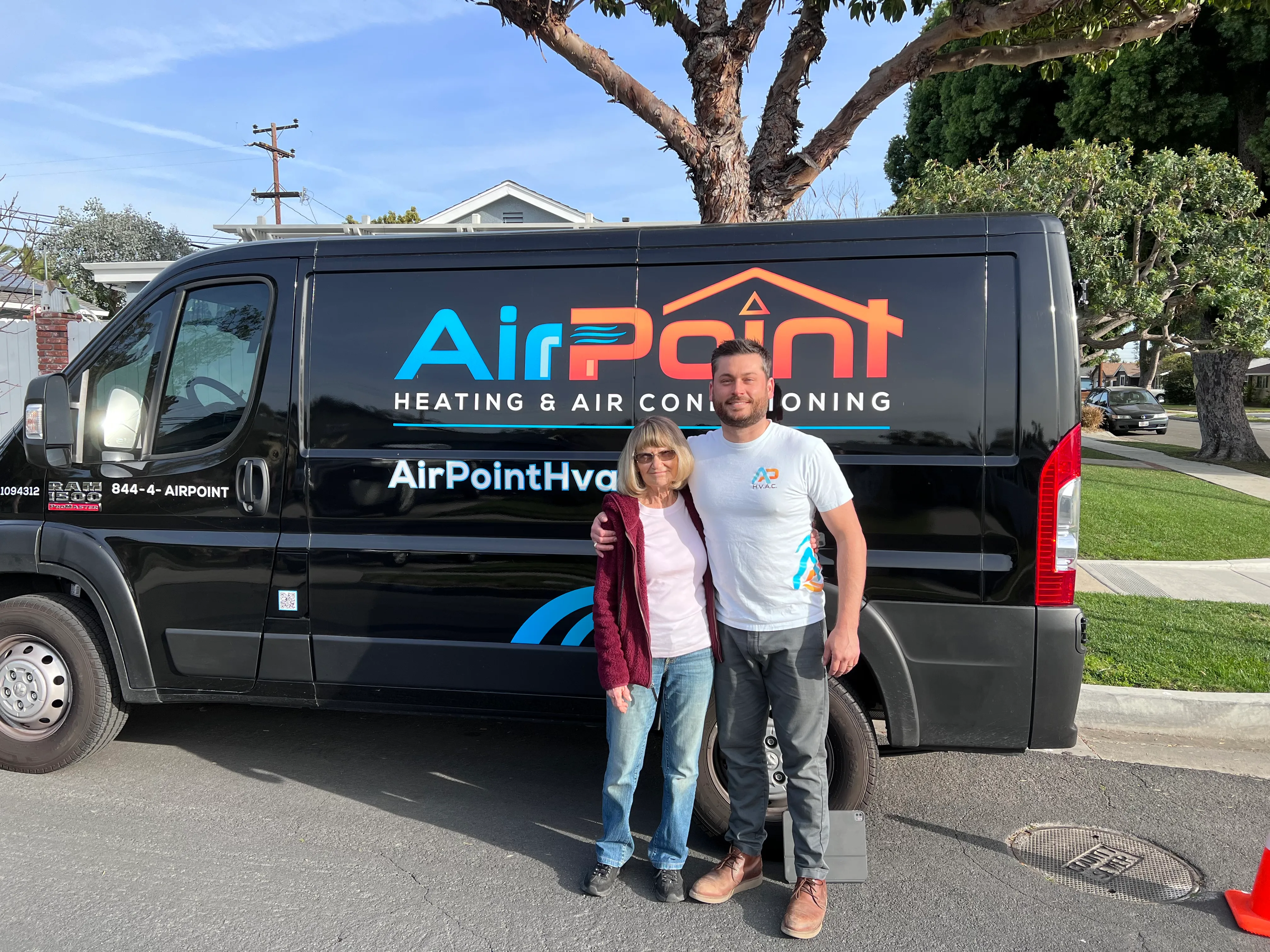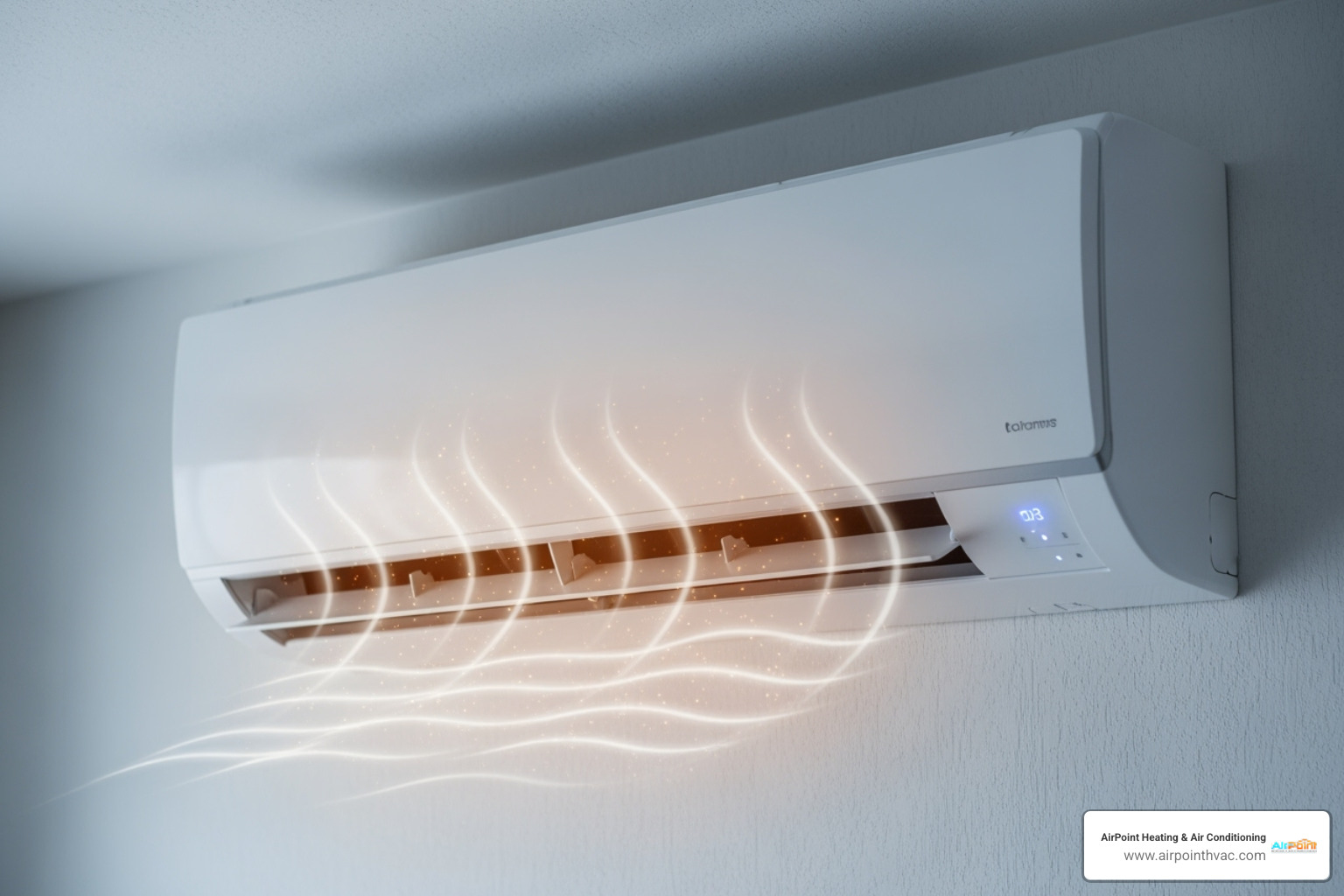
Why Your AC Is Blowing Warm Air Instead of Cold
Finding your AC blowing warm air instead of cool comfort can be incredibly frustrating. When you turn on your air conditioner, you expect a blast of refreshing cold air. If you're feeling warmth, your system isn't working right.
Here are the most common reasons your AC might be blowing warm air:
- Dirty Air Filter: A clogged filter blocks airflow.
- Incorrect Thermostat Settings: The thermostat might be set to 'heat' or 'fan only'.
- Low Refrigerant: Your system might be low on the special fluid that cools the air.
- Frozen Coils: Ice can build up on the indoor cooling coils.
- Tripped Circuit Breaker: The outdoor unit may have lost power.
An air conditioner doesn't create cold air. Instead, it removes heat from inside your home and releases it outside. It does this by circulating a special chemical, called refrigerant, through a closed system. This refrigerant absorbs heat from your indoor air, making it cool, and then carries that heat away to be released outside. When this process breaks down, you get warm air.

Simple Fixes You Can Try First When Your AC Blows Warm Air
When your AC is blowing warm air, it can feel like a major disaster, especially on a hot Southern California day. That instant wave of panic is totally understandable! But don't despair just yet. Before you pick up the phone to call in the cavalry (that's us, AirPoint Heating & Air Conditioning!), there are several simple troubleshooting steps you can take yourself.
Many common issues that lead to warm air are surprisingly easy for a homeowner to fix. Trying these basic checks first can often save you time and a service call. We always encourage our wonderful customers in Los Alamitos, Orange County, and surrounding areas to give these a try!

Check Your Thermostat Settings
This might sound super obvious, but you'd be amazed how often a simple thermostat setting is the sneaky culprit behind an AC blowing warm air. We've seen it countless times!
First things first: Make sure your thermostat is set to 'Cool' mode. Not 'Heat' (unless you want to warm up your home even more!) and definitely not 'Fan ON'. If it's on 'Fan ON', the blower will just circulate the air already in your home. This means no cooling happens, and that air can feel pretty warm if your house is already toasty. The best setting for cooling is 'Cool' mode with the fan set to 'Auto'. This way, the fan only kicks on when your AC is actively cooling, ensuring you get truly refreshing air.
Also, double-check that the temperature setting is lower than what it currently feels like inside your home. If your thermostat batteries are dead, or if you have a fancy programmable or smart thermostat, make sure it's not following an old schedule that's keeping it from cooling effectively. In rare cases, especially with heat pump systems, a faulty reversing valve could be stuck in heating mode. This would cause warm air even if the thermostat says 'Cool'. While that's usually a job for us, ruling out simple settings is your very first line of defense!
Troubleshooting an AC Blowing Warm Air Due to a Dirty Filter
A dirty air filter is one of the most common, yet easily preventable, reasons your AC is blowing warm air. Think of your air filter as your AC system's lungs. When it gets clogged with dust, dirt, pet dander, and other tiny airborne particles, it's like trying to breathe through a thick blanket! This severely restricts airflow.

When airflow is restricted, your AC has to work much, much harder to pull air through. This reduces its efficiency and cooling power. It can even lead to more serious problems, like frozen evaporator coils (which we'll chat about soon!).
Most systems need a new filter every one to three months. However, if you have furry friends, suffer from allergies, or have a big, busy family, we recommend checking it monthly. You might need to change it more often, perhaps every 30 to 90 days. It's super easy to do: just turn off your AC unit, find the filter slot (usually in your indoor air handler or a large return vent), slide out the old filter, and pop in a new, clean one. It's a quick, inexpensive fix that can make a huge difference in your air quality and the cool air coming from your vents!
Inspect the Circuit Breaker and Power Supply
If your AC is blowing warm air and you notice that the outdoor unit (that big box with a fan that sits outside) isn't running at all, you might have an electrical hiccup. The very first place to check is your home's electrical panel. Look for a tripped circuit breaker labeled for your air conditioner. It might be completely 'off' or in a middle, 'tripped' position. Simply flip it firmly to the 'off' position and then back to 'on'. This often does the trick!
Sometimes, there's also a separate disconnect switch right next to the outdoor unit itself. Make sure this switch is also in the 'on' position. If resetting the breaker doesn't get the outdoor unit humming, or if the breaker immediately trips again, it points to a more serious electrical problem or an issue within the AC unit itself. This is definitely when it's time to give us a call. Trying to use a multimeter for testing or digging deeper into electrical components without proper training can be dangerous. Safety first!
Ensure Vents and Registers Are Open and Unblocked
Proper airflow is absolutely vital for your AC to cool your home efficiently. If you find your AC blowing warm air, or even just notice that some rooms are unevenly cooled, take a quick stroll around your home. Check all your supply and return vents.
Supply vents are where the cool air comes out, and return vents are where the warm air goes in to be cooled. If return vents are closed or blocked by furniture, rugs, drapes, or even your curious kids' toys, it significantly reduces the amount of air your system can pull in to condition. This chokes the airflow throughout your entire system, making it work much harder and less efficiently, which can definitely lead to warm air coming from your vents. Similarly, blocked supply vents prevent that lovely cool air from actually reaching your living spaces! Make sure all your vents are wide open and clear of any obstructions to allow for optimal air circulation. It's a super simple step that can often resolve cooling issues surprisingly fast!
When an AC Blowing Warm Air Signals a Deeper Issue
While the previous steps cover common, easily fixable issues, sometimes your AC blowing warm air is a symptom of a more complex problem that requires professional attention. These issues can lead to significant system damage if not addressed promptly. At AirPoint Heating & Air Conditioning, our expert HVAC technicians are equipped to diagnose and repair these deeper issues, ensuring your home comfort is restored safely and efficiently.

Frozen Evaporator Coils
If you open up your indoor unit (the air handler) and see ice or frost on the evaporator coils, you've found a major culprit for your AC blowing warm air. These coils are where the refrigerant absorbs heat from your indoor air. When they freeze, they can no longer absorb heat effectively, and your system essentially becomes an expensive fan blowing uncooled air.
Frozen coils are usually a symptom of another problem, not the problem itself. Common causes include:
- Restricted Airflow: A dirty air filter (as discussed), blocked return vents, or even a collapsed air duct can starve the coils of warm air, causing them to get too cold and freeze.
- Low Refrigerant Levels: If your system is low on refrigerant, the pressure drops, causing the evaporator coils to get excessively cold and freeze.
- Clogged Drain Line: A clogged condensate drain line can cause water to back up, leading to moisture accumulation and potentially freezing on the coils. This can also lead to a musty smell due to mold or mildew growth.
If you find frozen coils, turn off your AC unit and switch the fan to 'ON' (if your unit has this option) to help melt the ice. Allow several hours for the coils to completely thaw. Once thawed, check your air filter and ensure all vents are open. If the coils refreeze, or if you suspect low refrigerant, it's time to call us.
Low or Leaking Refrigerant
Refrigerant is the lifeblood of your AC system; it's the chemical that actually absorbs and releases heat, enabling the cooling process. If your AC is blowing warm air and you've ruled out the simpler fixes, low refrigerant levels are a strong possibility. Unlike car ACs, a home AC system doesn't "use up" refrigerant. If levels are low, it means you have a leak.
Signs of a refrigerant leak include:
- Hissing or bubbling noises: You might hear these sounds coming from your indoor or outdoor unit.
- Inexplicably high energy bills: Your AC will run longer and harder to try and cool your home, consuming more energy.
- Coils that are cold but not frozen: While frozen coils can indicate low refrigerant, sometimes they're just unusually cold.
A refrigerant leak is not a DIY fix. Adding more refrigerant without fixing the leak is a temporary, wasteful solution and can even damage your system. Our certified technicians have the specialized tools and expertise to pinpoint the leak, repair it, and then properly recharge your system to the correct level. The cooling process relies on precise refrigerant levels, so this is a critical professional repair.
Dirty Condenser Coils or Outdoor Unit Obstructions
Your outdoor unit, known as the condenser, plays a crucial role in releasing the heat absorbed from your home. It's like the exhaust system of your AC. If your AC is blowing warm air, a dirty or obstructed outdoor unit could be to blame.
The condenser coils, which wrap around the outdoor unit, can become caked with dirt, dust, leaves, grass clippings, and other debris. This layer acts as an insulator, preventing the coils from efficiently dissipating heat. When heat can't be released outside, your system can't effectively cool your home.
To check this, make sure the unit is off (you can flip the breaker inside). Then, visually inspect the coils and remove any visible debris, such as leaves, twigs, or trash. We recommend keeping at least two feet of clear space around your outdoor unit to ensure proper airflow. While you can gently rinse the coils with a garden hose, a professional cleaning is often needed to get into the fins and remove built-up grime effectively.
Leaky or Damaged Ductwork
Your home's ductwork is the circulatory system of your AC, distributing conditioned air throughout your living spaces. If your AC is blowing warm air in certain rooms or you notice inconsistent temperatures across different vents, leaky or damaged ducts could be the culprit.
Duct leaks allow your expensively cooled air to escape into unconditioned spaces like attics, crawl spaces, or wall cavities before it ever reaches your living areas. This means your AC has to work harder and longer to try and cool your home, leading to higher energy bills and ineffective cooling. Conversely, these leaks can also pull warm, unconditioned air into your system, mixing with the cool air and resulting in warm air blowing from your vents. Research shows that leaking ducts can cause a loss of 20 to 30 percent of conditioned air!
Identifying and sealing duct leaks typically requires professional expertise and specialized tools, as much of your ductwork is hidden behind walls or in inaccessible areas. Our team can perform a thorough inspection and offer professional duct sealing services to restore efficiency and comfort to your home, whether you're in Downey, La Mirada, or anywhere in our Southern California service area.
Malfunctioning Compressor or Fan Motor
These are the big ones. If your AC is blowing warm air and you've checked everything else, the problem might lie with the compressor or the condenser fan motor.
- Malfunctioning Compressor: The compressor is often called the "heart of the AC system" because it's responsible for circulating the refrigerant and increasing its pressure and temperature. If the compressor fails, your AC unit simply cannot cool. Signs of a failing compressor can include strange noises like loud rattling, chattering, clicking, or rumbling coming from your outdoor unit. It might also struggle to start or hum loudly without actually running. A failed compressor usually means a major repair or even a system replacement.
- Condenser Fan Motor: The fan in your outdoor unit pulls air over the condenser coils to help dissipate heat. If this fan motor breaks or the fan blades are obstructed, the condenser coils can't release heat, causing the system to overheat and potentially shut down, or continue running but only blow warm air. You might notice the outdoor unit running, but the fan isn't spinning, or it's making grinding noises.
Both compressor and condenser fan motor issues are complex mechanical failures that require a professional HVAC technician. Attempting to fix these yourself is not recommended due to safety risks and the intricate nature of the components. When these critical parts fail, our AirPoint Heating & Air Conditioning experts are here to provide fast, reliable repair or replacement solutions.
How to Prevent Your AC From Blowing Warm Air in the Future
An ounce of prevention is worth a pound of cure, especially when it comes to your AC system. While we're always here to help when your AC is blowing warm air, we'd much rather help you prevent that frustrating scenario in the first place! Regular preventative maintenance is key to ensuring your system runs efficiently, lasts longer, and provides consistent cool comfort.

The Importance of Regular Professional Maintenance
Think of your annual AC tune-up as a routine check-up for your home's most important comfort system. Just like your car needs regular oil changes, your AC needs professional attention to keep it in top shape. We recommend scheduling an annual maintenance appointment, ideally in the spring before the summer heat hits.
During a professional tune-up, our skilled technicians perform a thorough inspection. We start by cleaning coils, both the indoor evaporator and outdoor condenser, to make sure heat can transfer efficiently. We'll also check refrigerant levels and carefully look for any leaks, fixing them before they turn into big, costly problems. Your AC has many electrical parts, so we inspect electrical components like wiring and capacitors for any wear or damage that could lead to power issues.
We also make sure to clear drain lines to prevent water from backing up, which can cause frozen coils. To keep everything running smoothly, we lubricate moving parts like motors and bearings, reducing wear and tear. We'll also check the airflow and blower to ensure air is moving freely through your home's ductwork. And finally, we perform thermostat calibration to make sure it's accurately reading temperatures and talking to your system correctly.
Why bother with all this? Regular maintenance helps us catch tiny issues before they become huge, expensive repairs. It also makes your AC last longer – most units can go 15 to 20 years with proper care! Plus, a well-maintained AC runs more efficiently, which means lower energy bills for you. It's a win-win!
Consistent Homeowner Maintenance Habits
While professional maintenance is super important, there are also simple, everyday things you can do as a homeowner to keep your AC happy and stop it from blowing warm air.
First, change filters regularly. This is truly the easiest and most important thing you can do! Check them monthly and swap them out every 1 to 3 months. If you have furry friends or allergies, you might need to do it even more often.
Next, keep your outdoor unit clear. Make sure to regularly clear away any leaves, grass clippings, or other debris that might gather around it. It's best to have at least two feet of clear space all around your outdoor unit. This helps it "breathe" and work its best.
Always monitor its performance. Pay attention to how your AC sounds and feels. Are there new, strange noises? Is the air coming out weaker than usual? Has your energy bill suddenly jumped? Catching these small signs early can save you from bigger, more annoying problems down the road.
Consider investing in a smart thermostat. These clever devices can help you manage your home's temperature more efficiently. They can even learn your habits and sometimes alert you to potential issues before you even notice them!
Finally, seal home air leaks. While this isn't strictly AC maintenance, it makes a huge difference. Sealing up gaps around windows, doors, and other openings stops warm outside air from sneaking into your home. This means your AC doesn't have to work as hard, saving you energy and keeping you cooler.
By combining these simple homeowner habits with regular professional maintenance from AirPoint Heating & Air Conditioning, you can look forward to reliable, efficient cooling for many years to come. No more unexpected blasts of warm air!
Frequently Asked Questions about ACs Blowing Warm Air
Should I turn off my AC if it's blowing warm air?
Yes, absolutely, you should! Think of it like this: if your car suddenly starts making a terrible grinding noise, you wouldn't keep driving it, right? The same goes for your AC. If your AC is blowing warm air, it's a clear sign something isn't right.
Continuing to run a malfunctioning system can actually make the problem worse. It can put undue strain on expensive components, especially the compressor, leading to even bigger (and more costly!) repairs down the line. Plus, it's a huge waste of energy! Your unit is running, but it's not actually cooling your home, just racking up your utility bill. So, flip that thermostat to "off" or "fan only." Once it's off, you can try some of the simple troubleshooting steps we mentioned, or better yet, give us a call for professional service.
How much does it cost to fix an AC that's blowing hot air?
The cost to fix an AC blowing warm air can really vary quite a bit, depending on what's causing the trouble. Some fixes are incredibly simple and might not cost you anything more than a few minutes of your time – like checking your thermostat settings or changing a super-dirty air filter.
However, for more complex issues, the repair costs can be more significant. For instance, fixing a faulty thermostat is usually a quicker job, while dealing with a refrigerant leak or replacing a major part like a compressor involves more specialized work. We always believe in full transparency, so when our expert technicians come out, they'll diagnose the issue and provide you with a clear, honest quote before any work begins. That way, you'll know exactly what to expect.
How long should an AC unit last?
That's a great question! With the right care and a bit of love, most AC units are built to last a good long while – typically anywhere from 15 to 20 years. Here in sunny Southern California, our ACs often work extra hard, so factors like how often you use it, the quality of its original installation, and especially how consistent you are with maintenance all play a big part in its lifespan.
As your system gets older, you might start noticing some tell-tale signs. Maybe it's not cooling as well as it used to, or it's breaking down more often, or your energy bills are mysteriously climbing. While we can often breathe new life into older units with repairs, there comes a point where investing in a new, more energy-efficient model actually makes more sense in the long run. Our team can help you weigh the options and decide whether a repair or a brand-new system is the best choice for your home and your wallet.
Conclusion: Get Your Cool Air Back for Good
Nobody wants to face a summer day with their AC blowing warm air. It's a real bummer, right? But as we've journeyed through the ins and outs of AC troubleshooting, we hope you've finded that many common issues actually have pretty straightforward solutions. From a simple tweak to your thermostat settings or a quick filter change, to more complex challenges like a pesky refrigerant leak or a tired compressor, understanding what's going on is truly the first step to getting that wonderfully cool air flowing again.
Taking prompt action is super important. Catching those little quirks early can often prevent them from snowballing into big, expensive headaches down the road. So, while we absolutely encourage you to try those basic troubleshooting steps we covered, please don't ever hesitate to reach out to the pros for anything that feels a bit beyond your comfort zone or expertise. That's what we're here for!
At AirPoint Heating & Air Conditioning, we're not just another HVAC company. We're an award-winning, family-owned business, proudly serving our Southern California neighbors with fast, expert residential HVAC services. Whether you're in Los Alamitos, Mission Viejo, Newport Beach, or any of our wonderful communities, we're dedicated to bringing you top-notch repairs, smart upgrades, and air quality solutions. Plus, we stand behind our work with a 100% satisfaction guarantee, because your home comfort really is our top priority.
So, if your AC is still blowing warm air after you've tried these helpful tips, or if you just have that feeling it might be something more serious, please don't suffer through the heat any longer. Let us help you get back to cool, comfortable living!
Schedule your AC service in Huntington Beach, CA or any of our service areas today. We can't wait to help you chill out!
Other Blogs
Latest Blog Posts
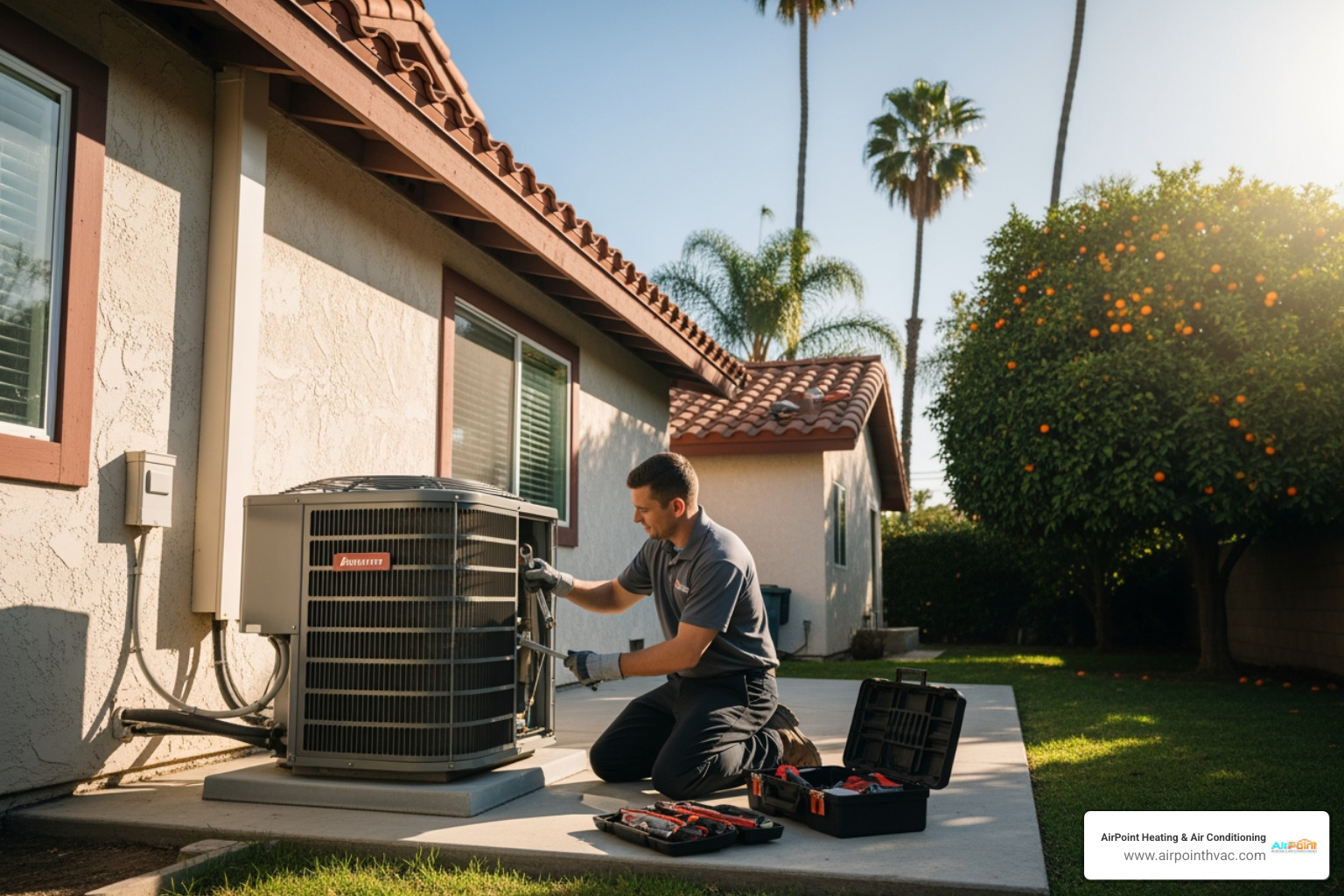
Keep Your Cool: The Ultimate Guide to AC Tune-Up Services in Anaheim, CA
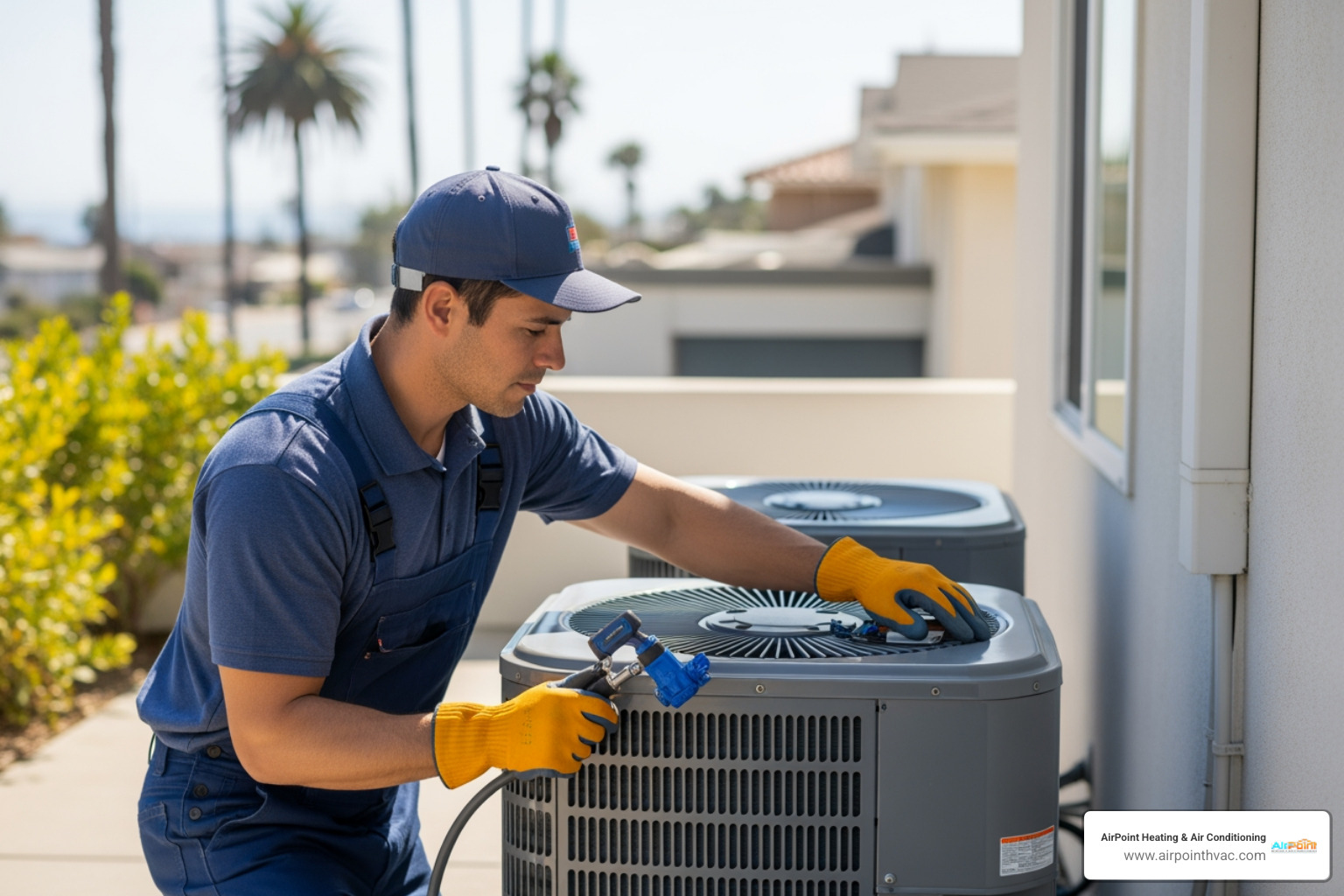
Keep Your Cool: Top-Rated & Affordable AC Tune-Ups in Laguna Beach, CA
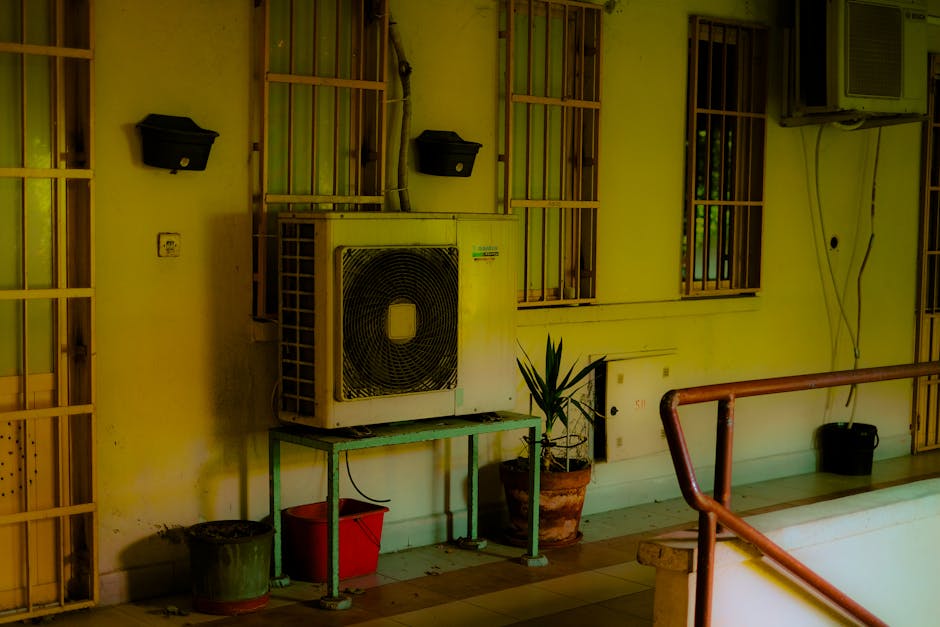
Cerritos AC Installation: Uncovering the Best Deals
Customer Testimonials










